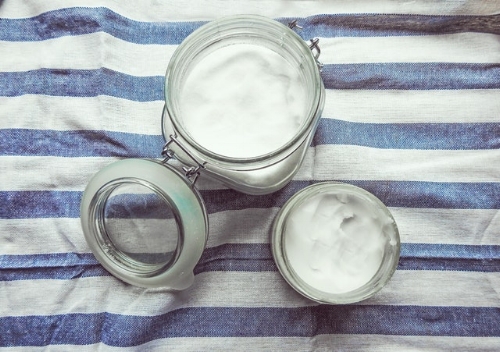Coconut Oil Drama & Why You'll Want To Hear What This PVD Wellness Practitioner Says Before Tossing Yours
No, Coconut Oil is not a Poison.
Don’t panic.
Just because some a doctor affiliated with Harvard called coconut oil a poison doesn’t mean you have to immediately throw it away and completely cut it out of your diet.
In a recent lecture, adjunct Harvard Professor Dr. Karin Michels repeatedly called Coconut oil “Pure Poison.” The 50 minute talk (in German) went viral with over 1,255,000 views on YouTube and discusses types of dietary fats and why saturated fat, including coconut oil, is so bad for you. YouTube can translate into semi-coherent English closed captioning, so if you’re really interested and have remarkable patience, have at it.
Why did this video go viral? My guess is that the media picked up on the sound bite and the Harvard affiliation to create “clickbait” controversy and headlines.
While it’s true there is a LOT of hype about coconut oil and it’s superfood status in the wellness world, I take most nutritional advice out there with a grain of salt. There’s always controversy about nutrition in general. There are, however, some published health benefits from consuming coconut oil. (Don’t put it on your face. That’s another post…)
A study printed in the March 2018 British Medical Journal compared dietary intake of 50g per day of coconut oil, butter and olive oil. The study separated participants into three groups and asked them to add 50g per day of coconut oil, butter and olive oil to their diets. For reference, 50g of oil is about 4 Tablespoons and about 470 calories.
In the coconut oil group, it was found that after 4 weeks Coconut oil significantly increased HDL-C (“good” cholesterol) compared to butter. LDL-C (“bad” cholesterol) concentrations were significantly increased on butter compared with coconut oil and were the same for coconut oil and olive oil.
Coconut oil also significantly lowered C-reactive protein (a marker of inflammation in the body) compared with olive oil. High C reactive protein is associated with increased risk of heart attack, so lower is certainly better, and if Coconut oil can help lower it? Sounds like there’s some validity in consuming it.
Where the controversy lies is that more than 90% of the fat in coconut oil is saturated fat. However, the saturated fat in coconut oil is different from the saturated fat in meats, so some claim that coconut oil doesn’t have the same negative health impacts. Some claim that the MCTs (medium chain triglycerides) in coconut oil can help you lose weight.
Nutrition is a controversial subject. You can find conflicting studies and theories and fad diets and super-foods and health coaches and industry sponsored doctors. Sometimes it’s hard to know where to find the best information.
I tend to go by the following advice of Michael Pollen: Eat food and not food products. Eat what your grandparents would recognize as food, and shop primarily around the perimeter of the grocery store.
Like many things in nutrition, and life, moderation is key. There is always a new trendy (and often beneficial) superfood to try. As long as you don’t have allergies, consider incorporating a moderate amount of these foods into an already healthy diet. Superfoods won’t save you if you eat McDonald’s for every meal and dipping your fries in coconut oil won’t make them any more healthy.
More About Dr Mary Claire Dilks
Dr Mary Claire Dilks is a Doctor of Acupuncture and Oriental Medicine and owner of Emerging Energy Acupuncture in Providence (RI). She has also been named Best Of RI ("Best Inner Healing"). Visit her at www.emergingenergy.net.





